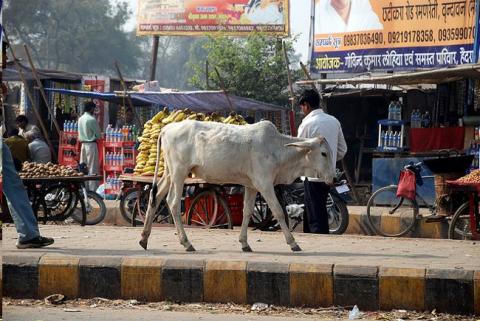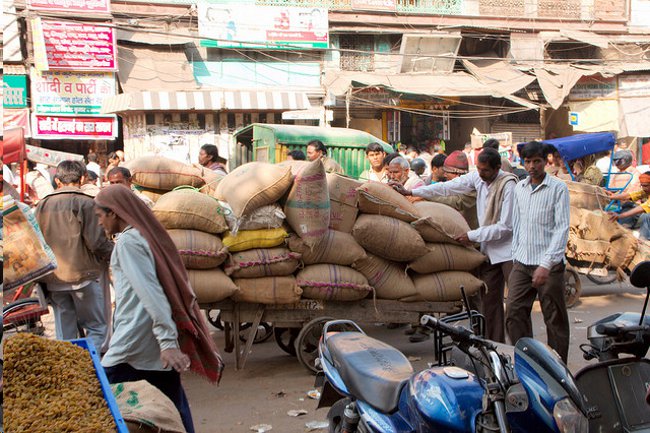Homeless and Migrant: Delhi’s Unlikely New Voting Bloc

From FirstPost and our content partner, New America Media:
Editor’s note: Key assembly elections in five Indian states are underway, during which a total of 110 million voters are eligible to cast their ballots. Votes will be tallied on Dec. 8. Observers say the polls could show how the electorate may vote in the general elections in 2014. FirstPost commentator Sandip Roy highlights one of Delhi’s fastest growing voting blocs:migrants.
When Ratan Kumar, who does painting odd jobs in Delhi, wants to cast a vote, he usually needs to travel for 14 hours back to his village in Uttar Pradesh. Alamgir, a rickshaw mechanic, has to go even further - all the way to Bihar. This year, however, both will just be able to walk over to a polling booth much closer to their jhuggi in Karol Bagh in Delhi.
Kumar has lived in Delhi for 10 years. Alagmir has spent eight years in the capital. This election, for the first time, they will count as voters in the city as opposed to just being part of what politicians call “Delhi's migrant problem.”
“I met a rickshaw puller who was 72 years old,” says General Bhopender Singh, founder of the NGO Maitri. “He said he was pulling a rickshaw since the prime minister was Nehru. In my reckoning he is more of a citizen of Delhi than anyone else.”
But the city does not think so. At least not until now. Marina Faetanini of UNESCO says she went to a school of planning and architecture to talk about migrants and urban planning. “I heard expressions like migrants should be kicked out, migrants are a burden, migrants don't know to behave,” she recalls. UNESCO has just brought out a report on the social inclusion of internal migrants in India. “Delhi would not be as prosperous as it is without migrants,” says Faetanini. “There are problems. But we can't pretend migrants will not come. In fact, Delhi is lucky to be called a city of migrants.”
This latest endeavor to get the migrants' vote is a belated acknowledgement of that reality. Until now many states have rolled out services for migrants. Bangalore-based LabourNet issued them identity cards that get them accident insurance coverage and a bank account. Disha Foundation in Nashik has helped them get enrolled in trade unions to protect them from police harassment and wage exploitation. In 2012, Kerala gave away goodwill kits to migrants for Onam - a box with vegetables, rice, oil, sugar, tea and red pepper.
But the vote goes way beyond these sops and services. Especially for a population that is both homeless and migrant - usually the butt of harassment.
Project Awaaz under Maitri helps migrants like Ratan and Alamgir get the vote. “We identify them on behalf of the Election Commission and based on our surety, that they are who they are, that they have been here for six months, and will be here for at least another six months, the commission gives them voter cards,” says Singh. Awaaz has registered about 4000 people. Out of them 2,500 have already got cards. Singh estimates there are about 10-12 lakh rickshaw pullers alone in Delhi, most of them migrants. The cards might just carry Maitri's night shelter in the jhuggi as the "address".
Advocates think of this as a win-win. Poor migrants do not want to make the long trek home just to vote. Political parties now have a new constituency they can woo as a bloc. “We have got them only 2,500 cards,” says Singh. “If 10 years down the line, there are 30,000 cards issued in central Delhi to rickshaw pullers, I cannot fathom any politician ignoring this captive vote bank.” This vote bank is unusual; it's not about the village, or religion, or caste. “Their religion is basically to get livelihood,” says Singh. In elections where margins of victories can be quite small, a few thousand, even a few hundred votes, they could become the new swing vote.

At the jhuggi in Karol Bagh, a veritable garage of scores of rickshaws, Ratan Kumar seems unaware of his new-found status - whether as kingmaker or political pawn. As he boils his tea on an open flame, he's just happy that his new card will make it easier to get a SIM for his phone. His wife Sanju Devi says no one has come yet to ask for their vote. But if they do come, she knows what she wants. Toilets.
The jhuggi has been enclosed with high wires by the Delhi authorities. That means at night they cannot climb the walls and go to the park or to the mobile toilet in a nearby lot to relieve themselves. This is a major problem, especially for women. Almost 2000 people are crammed into the jhuggi without any amenities. When it rains it's hard for even the NGO workers to get in through the muck. At other times water is a problem. “Sometimes we do not get to take a bath for a whole week,” says Sanju. She says for the solitary naked bulb in their shanty, she might have to shell out as much as Rs 250 - 300. That's in addition to rent. “Whether we have anything to eat or not, we have to give that,” she says. “Otherwise they say we will break your pots and stop your electricity.”
She still does not quite grasp the power of the voter ID card which she has kept carefully inside her house. An NGO worker tells them that if they all got together as voters the netas would have to come to them and pay attention.
It's possible that political attitudes might change in the days to come. Bhopender Singh says while political parties might be smelling a new voting bloc, the voter ID card is actually going to have an impact far beyond this election. Clubbed with a UID card, it can help open bank accounts, get them ration cards, allow them to access HIV and tuberculosis treatments far more readily, get work from contractors. “Identity is a key challenge,” says Faetanini. “Other sub-challenges cascade from it. It's good someone is getting them cards. But this should continue beyond the election.”
The new voters of the jhuggi in Karol Bagh are still tentatively figuring out their new status. One complains her card has not come yet. Another says the picture on her card is bad - half human and half bhoot (ghost). “I have not used it yet,” says Ram Nath Mandal as he fixes a rickshaw's wheel. “But my name has come. I will surely vote. Why not?”
“Maan lo, Delhi ke nagarik ho gya (See, I have become a citizen of Delhi),” says Alamgir. “And I also got a SIM.”
One day politicians will visit these jhuggis making promises that politicians make before the elections. Homegrown jhuggi netas will sprout up and promise to deliver the votes en bloc. But as of now, Rama says she is still waiting to see what change the voter card will deliver.
“Jab tak suhaag raat na aayega, batayen kaise achhey hain ya nahin (Until the wedding night happens, how can I tell you if it's good or not?” she chuckles.
FirstPost
Photos: Slazgrc (Flickr); Christian Haugen (Flickr).






























































































































































































































































































































